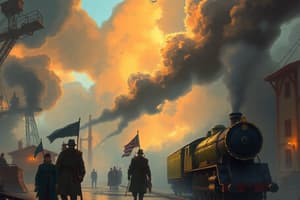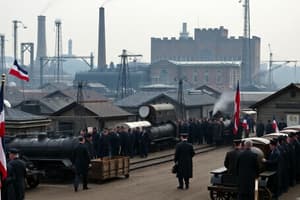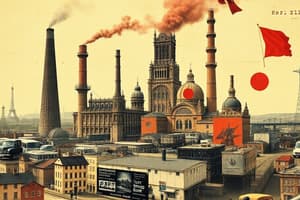Podcast
Questions and Answers
What was a significant social issue associated with the Industrial Revolution?
What was a significant social issue associated with the Industrial Revolution?
- Rise of trade unions
- Establishment of public schools
- Harsh living conditions (correct)
- Increase in agricultural jobs
What was the primary goal of the Meiji Restoration in Japan?
What was the primary goal of the Meiji Restoration in Japan?
- To modernize and industrialize the country (correct)
- To establish a feudal system
- To expand into neighboring territories
- To promote isolationist policies
How did Otto Von Bismark utilize nationalism in his political strategy?
How did Otto Von Bismark utilize nationalism in his political strategy?
- By promoting peace with rival states
- By leading his country into war (correct)
- By restricting military expansions
- By encouraging influential diplomats
What concept was used to justify imperialism and suggested that stronger countries would dominate weaker ones?
What concept was used to justify imperialism and suggested that stronger countries would dominate weaker ones?
What was the significance of the Suez Canal in the context of European trade?
What was the significance of the Suez Canal in the context of European trade?
Flashcards
Industrial Revolution
Industrial Revolution
The shift from agricultural work to factory-based employment, driven by technological advancements and industrial growth, but often marked by harsh living conditions and exploitation, including child labor.
Nationalism
Nationalism
A powerful feeling of pride and identification with one's nation, often used to unite people, but also sometimes leading to conflict and imperialism.
Imperialism
Imperialism
The process by which powerful nations extend their control over weaker territories, often exploiting resources and labor for economic gain, but also leading to social and political injustices.
Capitalism
Capitalism
Signup and view all the flashcards
Socialism
Socialism
Signup and view all the flashcards
Study Notes
The Industrial Revolution
- Marked a shift from agricultural to factory-based work.
- Triggered by growth and technological advancements.
- Involved harsh living conditions, including child labor and women working in factories.
- Originated in England and the US around 1750.
- Led to fluctuations in pricing based on demand.
- Transformed perspectives on technology's role in society.
Nationalism
- Fosters national pride and identity.
- Emperor Meiji established education systems in his country and modernized Japan.
- Giuseppe Garibaldi unified Italy.
- Otto von Bismarck utilized nationalism to motivate Prussia, which unified into Germany via war and expansion.
Industrialism and Imperialism
- Industrial production fueled imperialism by generating profits and enabling empire expansion.
- Resources in Africa drove colonization efforts.
- The "White Man's Burden" justified imperialism.
- Social Darwinism explained dominance as related to strength.
- Imperialism led to exploitation and discrimination.
Transportation and Global Conflicts
- The Suez Canal shortened the sea route between Europe and India by 6,000 km.
- The Boxer Rebellion was an anti-foreigner uprising in China.
Economic Systems
- Communism : No private ownership.
- Capitalism : Private ownership of resources and businesses.
- Socialism : Collective ownership of businesses and resources.
Studying That Suits You
Use AI to generate personalized quizzes and flashcards to suit your learning preferences.




